
African spirituality offers Black believers ‘decolonized’ Christianity
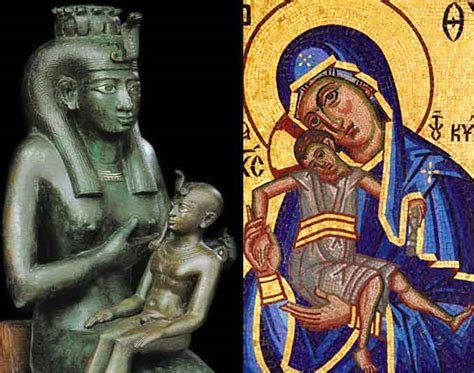
The pastor of the online Proverbial Experience mixes African spiritual practices with Christianity for worship ‘that is fully integrated with who I am.’
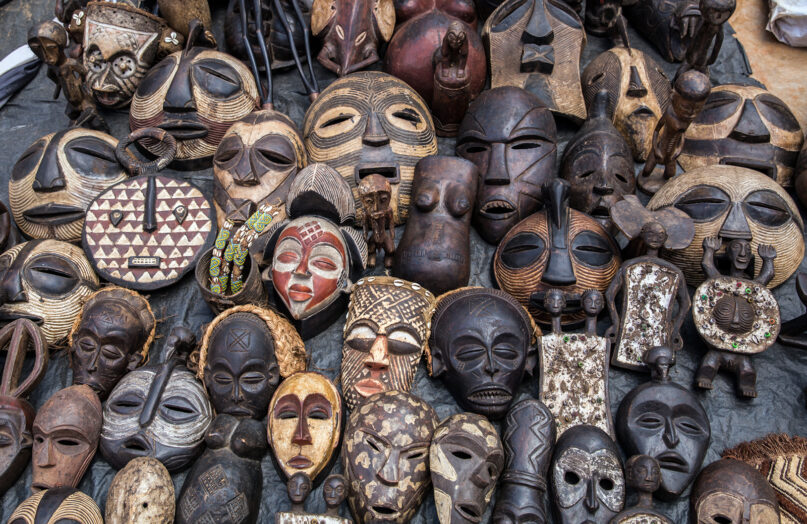
It’s 11:11 on a recent Sunday morning and The Proverbial Experience is just getting underway. “Greetings my loves!” proclaims the Rev. Lyvonne Proverbs Briggs, the founder of this weekly spiritual gathering on Instagram. “Anybody got a hallelujah in your spirit?”
As the congregation comes online, Briggs, from her home in New Orleans, greets each person by name as prerecorded gospel music plays. She frames herself in front of a makeshift altar with an assortment of crystals and a sign that reads, “God is love.”
RELATED SEARCH: Black Christians, don’t demonize African spirituality (COMMENTARY)
The worship service, with music and Bible readings, initially feels similar to the Black Episcopal church of Briggs’ youth, but within a few minutes, it takes a turn.
Briggs burns Palo Santo — literally, “holy wood” — and sage. She pours libations, a West African ritual used to honor ancestors — not only her congregation’s but freedom fighters, cultural and spiritual figures, and victims of police violence. As each name is called, water is poured and sealed with an exclamatory ashe, an amen from the Yoruba of Nigeria that means “and so it is.”
Briggs, who has degrees from Yale Divinity School and Columbia Theological Seminary, calls her African-centered form of spirituality “Christian adjacent.” It is drawn freely from divination practices such as astrology and tarot, while in her sermons she makes references to the African deities Oshun, Obatala, and Orisha.
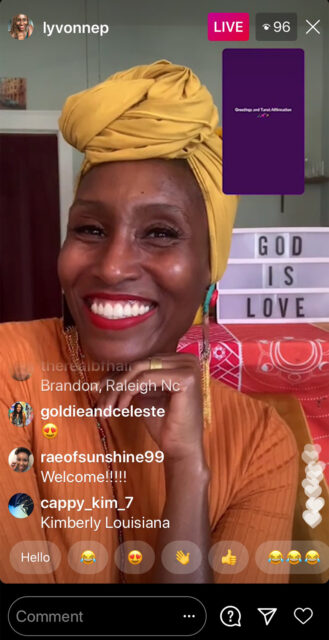
The Rev. Lyvonne Proverbs Briggs streams The Proverbial Experience on social media. Screenshot
“I am not your mama’s preacher. I honor the great rituals of my childhood faith,” she said. “But now that I have decolonized my religion, I have a duty and an obligation to present our ancestral wisdom and Indigenous spiritual practices in a way that is fully integrated with who I am.”
Most of those logging on to The Proverbial Experience on Sundays are Black women who share Briggs’ sense of authentic tradition. Many were raised in Baptist, Pentecostal or AME traditions but have since left the church and are on an African spiritual walkabout of sorts.
Briggs pushes them to embrace themselves fully while interrogating their faith and culture. “The fabric that binds us together is a quest, a revolution, and a rebellion for liberty, justice, restoration, and wholeness,” she told her flock, whom she calls “The Proverbial Kin,” in a sermon just after the presidential election.
“When you adopt an African-centered practice, you realize how deeply embedded it is in your being,” she said. “At this moment, African-descended people have had enough of trying to contort to a system that was built to annihilate us. If we are going to be truly free and liberated, it has to include our religion and spirituality (of our ancestors).”
One of those who tune in to The Proverbial Experience is Alicia Hudson, 37, who grew up attending Baptist and Pentecostal churches where people spoke in tongues and Jesus had blond hair and blue eyes. Now a resident of Brooklyn, New York, she no longer attends church but retains a love for the Book of Psalms and said she can find inspiration in a T.D. Jakes sermon.
But in recent years she’s integrated African spiritual and cultural traditions into her life. She’s studied Yoruba and Hoodoo, a form of folk magic that evolved in the pre-Civil War American South as a form of protection and resistance for the enslaved.
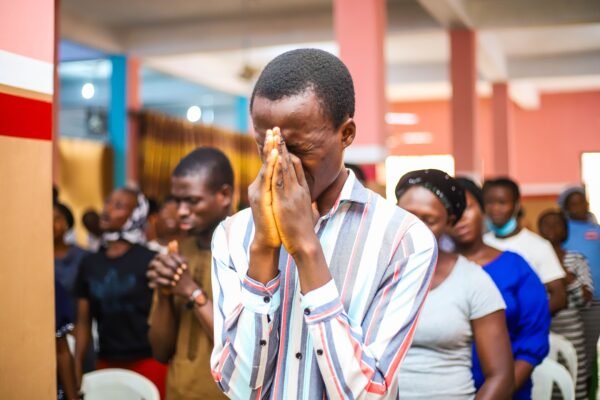
Hudson has assembled an ancestral altar in her home with photos of her grandparents and the names of her great-grandparents. Her new traditions say that these ancestors act as guides, protectors, and healers, providing physical, mental, and emotional support. Hudson makes regular offerings of fresh flowers, water, and coffee.
“It helps me feel more connected to them,” she said. “I’ve learned that our ancestors are close to us in the spirit realm.”

Hudson sees ancestral veneration, a common theme in Eastern religion as well, as a way to reclaim a practice that was subverted during slavery. “It’s been a beautiful process and a part of our healing,” she said.
This blending of Christianity with African religious traditions is not new. Indeed, scholars would point out that African religious ideas and practices, brought with the enslaved people from the 1600s on, are inextricable from American Protestant Christian practice, white and Black.
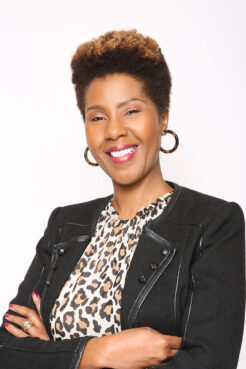
Darnise Martin. Courtesy photo
Briggs’ gradual evolution toward The Proverbial Experience began when she attended an African Presbyterian Church in Georgia that was blending African religious traditions and Christianity. She counts as influences the Rev. Maisha Handy at the Interdenominational Theological Center in Atlanta and the work of the Rev. Melva Sampson, a theologian at Wake Forest University.
What’s different, says Darnise Martin, associate professor of African American studies at Loyola Marymount University in Los Angeles, is where it is happening: in public forums and innovative churches such as Briggs’.
During slavery, any deviation from the Christianity of the slaveholder was forbidden and considered illegal. The establishment of hush harbors, a secluded areas in the woods where slaves would meet in private, provided opportunities for them to worship as they wished, but always under potential threat of punishment.
“This is why it’s so important to acknowledge and venerate Black ancestors,” said Martin. “They were the ones who had to hide this. They were the ones who were punished for this. Now we are the ones who can be out in public with it. We literally are the hope and dream of a slave.”

Breaking with traditional Christian practice can take courage. Hudson said she can’t share her new way of worship with her family. Spells and rituals associated with candle magick “are scary for them,” said Hudson. “They don’t understand that it goes beyond religion. What I’ve been doing on my own is reconnecting with my culture and learning the different ways that we celebrate God.”
Dee Blair, 41, has found similar freedom in experimenting with spiritual forms such as oracle cards, similar to tarot, which were prohibited in the mostly Caribbean Pentecostal church in the Bronx that she attended with her mother and siblings. “The biggest thing now is releasing whatever negativity has been attached to that,” she said.
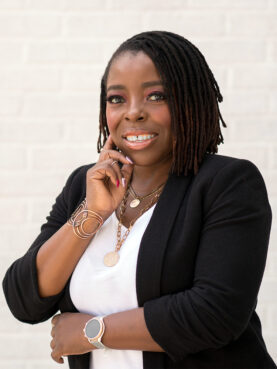
Fulei Ngangmuta. Courtesy photo
The Proverbial Experience is centered on people who look more like her. “I grew up with Black ministers that are men,” said Blair. “I don’t usually see myself represented in this arena. Here’s a woman who is talking bodily love, playing hip-hop and working with divination practices and melding them with Christianity.”
As free as they feel, some in the congregation are still struggling for the right words for their new spiritual life. “A lot of us still have churchy vernacular,” said Fulei Ngangmuta, who emigrated from Cameroon with her Christian parents as a baby. “Most of us probably won’t call ourselves Christians. But we do understand the traditions that we’re walking out of and we tap back into our spiritual origins of where we come from.”
Through relatives in Africa and online research, Ngangmuta, 40, traced her ancestry to the Kom people, in northwestern Cameroon. “The idea of all of this was to claim all these pieces of myself that had been suppressed or not spoken about because they were taboo,” she said. “I wanted to be free to be my full self.”

This story is one in a series by Religion News Service about New Religious Movements in American religion, produced in partnership with Sacred Writes, a Henry Luce Foundation-funded project hosted by Northeastern University that promotes public scholarship on religion.
We wish to inform readers that the beforementioned content is not our own, and neither do we claim it to be as such. All credit goes to religionnews.com for producing the original content. They have our endorsement.
Comments:
-
temp mail generator
Good post! We will be linking to this particularly great post on our site. Keep up the great writing
-
Fake Mail
obviously like your website but you need to test the spelling on quite a few of your posts Several of them are rife with spelling problems and I to find it very troublesome to inform the reality on the other hand Ill certainly come back again
-
Tree Mail
Fantastic beat I would like to apprentice while you amend your web site how could i subscribe for a blog site The account helped me a acceptable deal I had been a little bit acquainted of this your broadcast offered bright clear concept
-
Tree Mail
My brother recommended I might like this web site He was totally right This post actually made my day You cannt imagine just how much time I had spent for this information Thanks
-
shark tank weight loss gummies
Wonderful website. I’m sending it to some friends and also sharing in yummy. Thanks for your work.
-
apple cider vinegar weight loss gummies
My brother suggested I might like this website, and he was right. This post made my day. You would not believe how much time I spent for this information.
-
Puravive amazon
Magnificent beat I would like to apprentice while you amend your site how can i subscribe for a blog web site The account helped me a acceptable deal I had been a little bit acquainted of this your broadcast offered bright clear idea
-
Puravive Review
Fantastic site Lots of helpful information here I am sending it to some friends ans additionally sharing in delicious And of course thanks for your effort



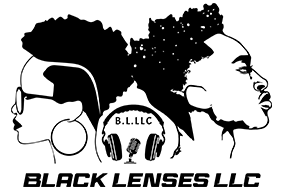

Cynthia Gourdine
These teachings are the same as the ones Dr. Ray Hagan. Teches I love it!!!!!